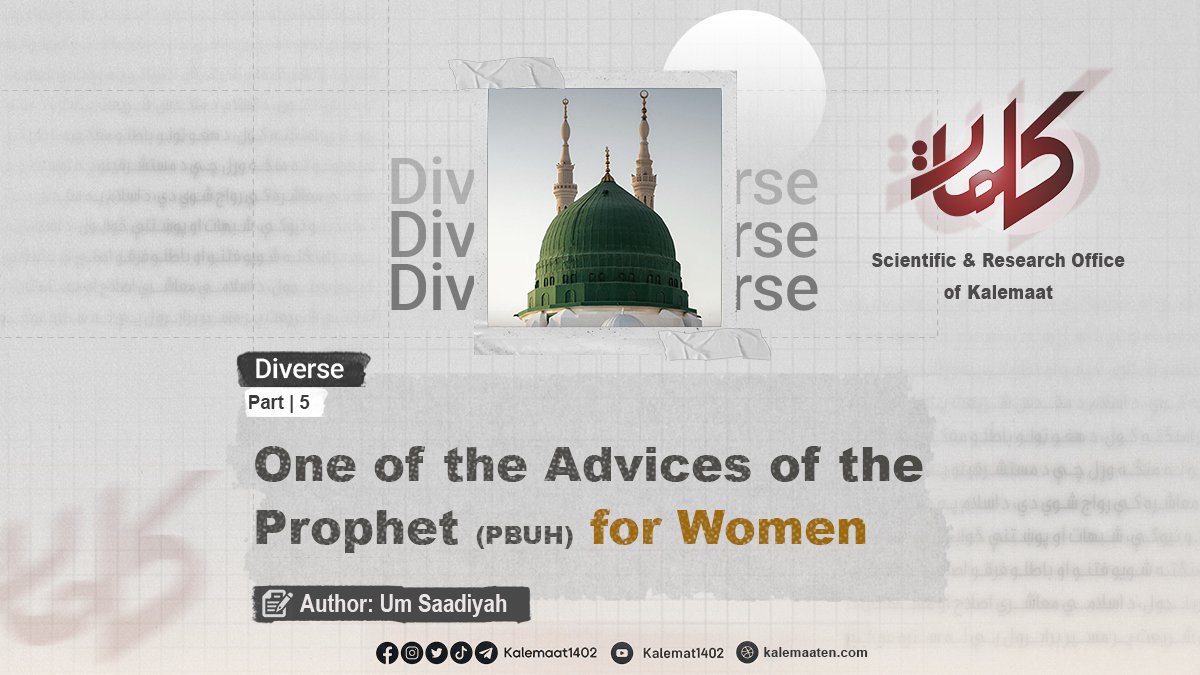Author: Um Saadiyah
One of the Advices of the Prophet (PBUH) for Women (Part 5)
13. The Prescribed Period of Mourning for the Deceased
From Zainab, the daughter of Abu Salamah (may Allah be pleased with her): When Abu Sufyan passed away, I went to Umm Habibah (MABH), the wife of the Messenger of Allah (PBUH) and the daughter of Abu Sufyan. She asked for some perfume mixed with Khaluq or another yellow substance. She first applied a little of it to a young girl, then applied it to her own cheeks, and said: ‘I have no need for perfume, but I heard the Messenger of Allah (PBUH) say while on the pulpit: “It is not permissible for a woman who believes in Allah and the Last Day to mourn for a deceased person for more than three days — except for her husband, for whom she must mourn for four months and ten days.””
Zainab said: When the brother of Zainab bint Jahsh passed away, I visited her. She also asked for perfume, applied it to herself, and said: By Allah, I have no need for perfume, but I heard the Messenger of Allah (PBUH) say while on the pulpit: It is not permissible for a woman who believes in Allah and the Last Day to mourn for a dead person more than three days, except for her husband, for whom she should mourn four months and ten days. [1]
So, my sister! If you lose a dear one, you should not mourn for more than three days, except for your husband, for whom mourning lasts four months and ten days. Strictly avoid reviving grief again and again, for it contradicts the Sunnah. The customs that women practice today—such as gatherings on the fifth day, the seventh, the fortieth, the yearly anniversary, etc.—are all considered innovations and disobedience to Allah and His Messenger.
14. Warning Against the Use of Perfume
Abu Musa (MABH) narrated that the Messenger of Allah (PBUH) said: Every eye commits adultery, and if a woman wears perfume and passes by a gathering, she is such and such, meaning she is considered adulterous.
So, my Muslim sister! Strictly avoid using perfume when going out for a need or walking in the street, for it is forbidden. You may use perfume at home and beautify yourself for your husband, but if you do so while leaving the house, you fall under the warning of this Hadith.
15. Altering the Creation of Allah
Ibn Masʿūd (may Allah be pleased with him) said: The Messenger of Allah (MABH) cursed four types of women who alter the creation of Allah:
1. The women who tattoo others;
2. The women who get themselves tattooed;
3. The women who pluck their eyebrows;
4. The women who file their teeth to create spaces for beauty.
A woman objected to Ibn Masoud (MABH) regarding this. He replied: Why should I not curse the one whom the Messenger of Allah (PBUH) cursed? And the command of the Qur’an is the same: «وَمَا آتَاكُمُ الرَّسُولُ فَخُذُوهُ وَمَا نَهَاكُمْ عَنْهُ» Translation: “And whatever the Messenger gives you—take it; and whatever he forbids you from—abstain from it.” [2]
My sister! Recognize these categories of women:
• Namisah: A woman who plucks the eyebrows of others.
• Mutanammisah: A woman who plucks her own eyebrows.
• Mutafallijah: A woman who files or separates her teeth for beauty.
• Washimah: A woman who tattoos others with needles and black dye.
• Mustawshimah: A woman who gets herself tattooed.
Asma (MABH) said: “The Messenger of Allah (PBUH) cursed the woman who joins hair with the hair of others and the woman who seeks to have this done.” [3]
16. Prohibition of Seclusion with a Non-Mahram Man
Uqbah ibn Amer (MABH) narrated that the Messenger of Allah (peace and blessings be upon him) said: “Beware of entering upon women.” A man from the Ansar asked: “O Messenger of Allah, what about the in-laws of a woman’s husband?” The Messenger of Allah replied: “The in-laws are death.” [4]
My sister! The word al-ḥamw mentioned in the Hadith refers to the relatives of the husband, such as his brother, nephew, etc. It is not permissible for anyone other than your Mahram to be alone with you, for no non-Mahram man is ever alone with a woman without Satan being the third.
Continues…
Previous Part/ Next Part
References:
[1] Narrated by al-Bukhari and Muslim
[2] Qur’an, Surah al-Ḥashr, 59:7
[3] Narrated by al-Bukhari and Muslim
[4] Narrated by al-Bukhari and Muslim



